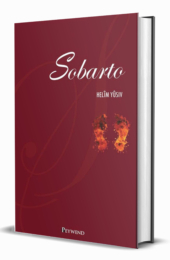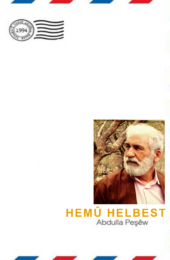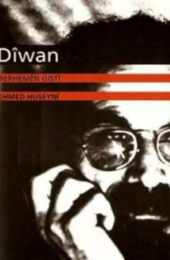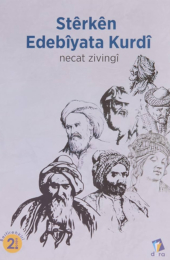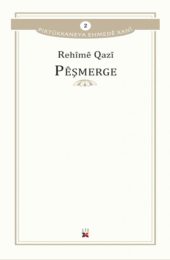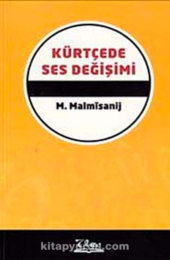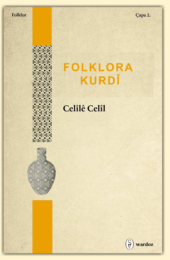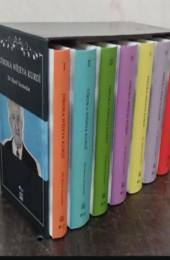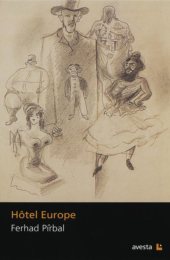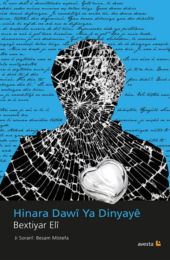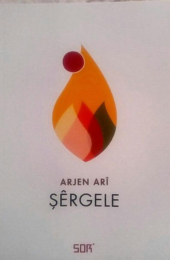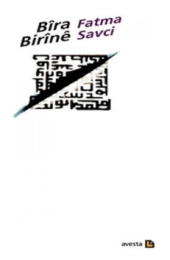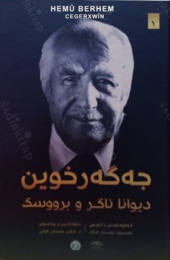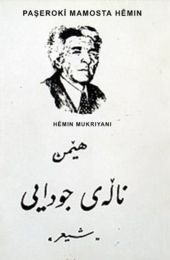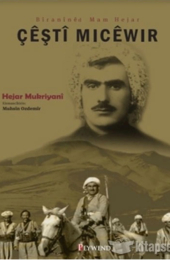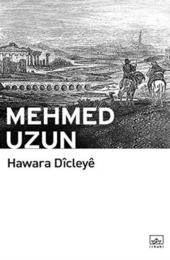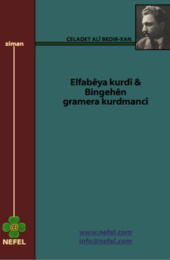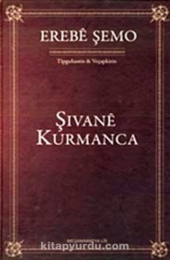Peşiyan 101 çirok, Çiroken Efsaneyen Kurdî, 101 BiwêjÇîrok
"Peşiyan 101 çirok, Çiroken Efsaneyen Kurdî, 101 Biwêj Çîrok Mehmet Öncü"
- Peşiyan 101 çirok is a Kurdish book written by Mehmet Öncü. It contains 101 stories, reflecting the richness of Kurdish language and culture .
- Çiroken Efsaneyen Kurdî is another work by Mehmet Öncü, showcasing Kurdish legends and myths .
- 101 Biwêj Çîrok is a separate publication, offering a diverse collection of stories, including border tales and narratives from Kurdish literature .
These works contribute significantly to the preservation and promotion of Kurdish language and storytelling traditions. Mehmet Öncü's writings provide readers with insights into the cultural tapestry and linguistic nuances of the Kurdish people.
Sobarto
Sobarto Helîm Yûsiv is a Kurdish author known for his literary works, including the novel "Sobarto" (Avesta/Roman) published in 1999 .
Yûsiv has authored several books, "Sobarto" is available in Kurdish and Arabic, reflecting Yûsiv's cultural and linguistic diversity .Widely recognized for his literary prowess, Yûsiv's works, including "Sobarto," have garnered positive reviews . Sobarto Helîm Yûsiv's impact extends beyond his novels, contributing significantly to Kurdish literature .
Hemû helbest
Abdullah Peşêw, a Kurdish poet: Abdullah Peşêw is a prominent Kurdish poet, born in 1946 in Hewlêr. He has been actively writing poetry for over 40 years, with eight published divans. His work is celebrated for its depth and cultural significance within the Kurdish literary landscape. His poetry collection, titled "Hemû Helbestên 'Ebdulla Peşêw'," showcases his comprehensive body of work.
Notable Works: Peşêw's notable works include the poetic series "Berg 1, 2, 3". One of his poems, "Qehpe ne," is available on YouTube, reflecting his poetic mastery.
Literary Impact: Recognized as a key figure in Kurdish literature, Peşêw's contributions have left a lasting impact, and his book "Abdulla Peşêw Rizgarkerê Dawî yê Helbesta" attests to his influence.
In summary, Abdullah Peşêw is a revered Kurdish poet with a substantial literary legacy, evident in his extensive body of work and lasting cultural impact.
Dîwan
Overview:
Dîwan Ehmed Huseynî refers to the literary works of Ehmed Huseynî, a Kurdish writer born in Amûd in 1955.
His literary works are in the Kurdish language, falling under the genres of poetry and literature[6].
Ehmed Huseynî's contributions to Kurdish literature include a diverse range of poetic and literary works, leaving a lasting impact.
Stêrkên Edebîyata Kurdî
"Stêrkên Edebîyata Kurdî Necat Zivingî" refers to the literary contributions of Necat Zivingî to Kurdish literature. Necat Zivingî, a Kurdish author, explores the state of Kurdish literature globally, examining its influence by Kurdish states, Kurdish intellectuals, schools, and Eastern cultures. The role of women in Kurdish literature is also a focal point. Necat Zivingî has shared insights through various platforms like YouTube, discussing topics such as language, culture, and the intersection of Kurd and Islam . His book "Stêrkên Edebîyata Kurdî" provides an in-depth exploration of Kurdish literature, and it is available for purchase. Additionally, Zivingî has contributed to an anthology titled "Stêrkên edebîyata kurdî" in 2015, further emphasizing the discussion on Kurdish literary achievements
Pêşmerge
Pêşmerge Rehîmê Qazî" refers to the Kurdish novel written by Rehîmê Qazî titled "Pêşmerge." The novel is a significant work in Kurdish literature, portraying the struggles and heroic deeds of the Kurdish Pêşmerge (guerrilla fighters) through a narrative rich in Kurdish cultural elements .
Rehîmê Qazî wrote "Pêşmerge" in Kurmanji Kurdish, using the Roman script . The novel was first published in 1958, marking an early contribution to Kurdish literature. Rehîmê Qazî's work gained recognition for its portrayal of Pêşmerge fighters during a critical period in Kurdish history .
Destpêka Edebîyata Modern
The beginning of modern Kurdish literature in the Istanbul stage, with the appearance of some Kurdish writers and the cradle of the beginning of modern Kurdish literature, such as Memê Alan.
The book "Modern Kurdish Literature" written by Ramazan Alan focuses on the beginning of Kurdish literature and presents its views and examples.
Ramazan Alan has written about "Colonial Studies, National Image and an Inverted Cliché in Modern Kurdish Literature".
With the teacher Zulkif Ergun, Ramazan Alan quickly created a standardized curriculum for all classes in the field of modern literature.
Kürtçede Ses Değişimi
In Kürtçe (Kurdish), like any language, phonetic changes occur over time and space. "Kürtçede Ses Değişimi" (Phonetic Changes in Kurdish) by M. Malmisanij explores these linguistic transformations. The book emphasizes that language, being dynamic, evolves with shifts in time and place, impacting various aspects, particularly in phonetics. For those intrigued by the subject, "Kürtçede Ses Değişimi" offers valuable insights into the dynamic nature of the Kurdish language.
folklora kurdî
Celîlê Celîl: A Kurdish historian and Kurdologist, born in Yerevan to a Yazidi Kurdish family in 1936.
Contributions: Celîlê Celîl has dedicated decades to studying and writing about Kurdish folklore. His work includes numerous books on Kurdish folklore, making significant contributions to the understanding of Kurdish cultural heritage. "Dîdarok û Qewlikên Zarokan" and "Zêmar" are among his notable works on Kurdish folklore. Celîlê Celîl has left a lasting impact on the understanding and preservation of Kurdish cultural heritage through his extensive work in folklore. His contributions continue to be recognized, and his books remain valuable resources for those interested in Kurdish folklore and cultural history. Celîlê Celîl's dedication has significantly enriched the appreciation of Kurdish heritage.
Mêjûy Edebî Kurdî
Mêjûy Edebî Kurdî Maruf Xeznedar refers to the literary magazine or periodical titled "مێژووى ئهدهبى کوردى / Mêjûy edebî Kurdî" created by Maruf Xeznedar (Marif Khaznadar) .
Maruf Khaznadar (1930–2010) was a contemporary Kurdish academic and writer, born in Erbil . He authored works such as "Le Babet Mêjûy Ede bi Kurdiyewe," a significant contribution to Sorani Kurdish literature.
His literary contributions include "Mêjûy Edebî Kurdî (1801-1850)" and other writings, reflecting his dedication to Kurdish literature.
The magazine is written in Kurdish, particularly in Sorani Kurdish.
Hotêl Ewrûpa
"Hotêl Ewrûpa Ferhad Pîrbal" is a novel written by Ferhad Pîrbal, a Kurdish author who sought refuge in Paris from Iraqi persecution in the 1980s
The book is titled "Europa Hôtel" and was published in 2019 by Maurice Nadeau, with translations by Gaspard Karoglan and Arthur Quesnay .
The story revolves around a Kurdish narrator in Paris, particularly in the Montmartre area, working in a hotel named Hôtel Europe .
Conclusion: "Hotêl Ewrûpa Ferhad Pîrbal" is a poignant novel depicting the experiences of a Kurdish refugee in Paris, reflecting on themes of displacement and adaptation.
Hinara Dawî yaDinyayê
- "Hinara Dawî ya Dinyayê" is a book by Bextiyar Elî, published by Avesta Yayınları .
- The book is in Kurdish, with 352 pages and dimensions of 0.39 x 5.31 x 7.68 inches .
- Bextiyar Elî is the author of several books, and "Hinara Dawî ya Dinyayê" is one of his works .
- Bextiyar Elî's writings encompass diverse topics, contributing to Kurdish literature .
- "Hinara Dawî ya Dinyayê" reflects elements of Realîzma Efsûnî in its narrative
Şêrgele
"Şêrgele Arjen Arî" refers to a Kurdish poem written by Arjen Arî. The poem celebrates the courage and strength of the lion, symbolizing bravery and resistance. The word "Şêrgele" translates to "lion" in Kurdish. Arjen Arî's work often explores themes of resistance and resilience against oppression, with the lion serving as a powerful metaphor.
Labirenta Cinan
Labirenta Cinan: A Brief Overview
Content and Language:
"Labîrenta Cinan" is a paperback in Kurmanji language (Northern Kurdish) authored by Hesenê Metê.
About the Author:
Hesenê Metê is the author of "Labirenta Cinan," and his works include board books like "LABİRENTA CİNAN".
Bîra Birînê
Bîra Birînê" is a collection of poems by Fatma Savci, a Kurdish poet. The title translates to "Memory of Birin" . Fatma Savci's poetry, including "Bîra Birînê," is rooted in the Heskîf tradition and is part of her third poetry book.
Hemû Berhem
- Cegerxwîn Overview: Hemû Berhem Cegerxwîn refers to the complete works of the Kurdish poet Cegerxwîn. Published in multiple volumes, these encompass his literary contributions. The collection is available in Kurdish and includes various genres, reflecting the richness of Cegerxwîn's artistic expressions [1][2][3].
- Dîwana Cegerxwîn: Dîwana Cegerxwîn specifically mentions a multi-volume set, with a distinctive edition called "Cilda Taybet" in Kurdish and Arabic, highlighting the comprehensive nature of Cegerxwîn's literary legacy [4].
- Further Insights: To gain deeper insights into Cegerxwîn's life and works, sources like YouTube may offer multimedia content, such as discussions or interviews, providing additional perspectives on his life and literary contributions [5][6].
Paşerokî Mamosta Hêmin
Paşerokî Mamosta Hêmin Hêmin Mukriyani refers to a collection of articles written by the Kurdish poet and journalist, Hemin Mukriyani (1921–1986). He was known by his pen name, Hêmin Mukriyani, and the collection was titled "Paşerokî Mamosta Hêmin" . The work is a compilation of his writings and articles, showcasing his contributions to Kurdish literature and journalism. Hemin Mukriyani was a prominent figure, celebrated for his poetry and journalistic endeavors, making this collection a valuable resource for those interested in his work and Kurdish literature
Çeştî Micêwir
"Hejar Çeştî Micêwir" refers to a Kurdish poet named Hejar Mukriyanî. He is known for his literary contributions, particularly in poetry. The phrase "Bîranînêd Mam Hejar ÇÊŞTÎ MICÊWIR" is associated with a work or collection authored by Hejar Mukriyanî, and it is available through Peywend Yayınları . Hejar Mukriyanî's poetry, such as "Çeştî Micêwir," has been recognized for its cultural and historical significance among Kurdish literature .
Birîna Reş
"Birîna Reş Musa Anter" refers to the book "Birîna Reş / Kara Yara" written by Musa Anter. Published in 1959, the book contains a significant part of Musa Anter's life story, focusing on the prevalent hardships in the eastern region of Turkey, such as diseases like trachoma, tuberculosis, leprosy, and the root cause – poverty . Musa Anter (1920-1992) was a prominent Kurdish writer, journalist, and political activist, with a notable body of work that includes "Birina Reş / Kara Yara" and other influential publications like "Qimil / Kımıl" and "Hatıralarım" . The book "Kara Yara / Birîna Reş" is available for purchase and has been described as a valuable literary work reflecting the socio-cultural landscape of its time
Hawara Dicleyê
Hawara Dicleyê is a novel by Mehmed Uzun, a prominent Kurdish writer. Published by İthaki Yayınları in 2010, the book explores the cultural and historical aspects of Dicle, presenting a reflection of contemporary society . It is part of a series, with Hawara Dicleyê 2 being another installment . The novel has received positive reviews and has a notable presence in Kurdish literature, contributing to Mehmed Uzun's literary legacy . The narrative delves into the rich cultural tapestry of the region, making it a significant work in Kurdish literature.
Elfabeya Kurdî
Elfabeya Kurdî Celadet Ali Bedirxan
Elfabeya Kurdi is a work by Celadet Ali Bedirxan, available in Turkish. It has 64 pages and is in paperback format.
Celadet Ali Bedirhan, a Kurdish intellectual, authored Elfabeya Kurdi. His Kurdish language contributions include grammar works like "Elfabeya Kurdi ü Bingehen-Gramera Kurmanci".
In summary, Elfabeya Kurdî by Celadet Ali Bedirxan is a Turkish language work, and Celadet Ali Bedirhan is known for his significant contributions to Kurdish linguistics. The book is available on various platforms in different formats.
Şivanê Kurmanca
Şivanê Kurmanca Erebê Şemo is the title of the first Kurdish novel written by Arab Shamilov, also known as Erebê Şemo, a prominent Yazidi Kurdish novelist and scholar who lived in the Soviet Union. The novel was written in Kurdish and published after 74 years, using the Celadet Elî Bedirxan alphabet. Erebê Şemo played a significant role in modern Kurdish literature, and his work marked a milestone in the development of contemporary Kurdish literature.
Stars: Erebê Şemo

